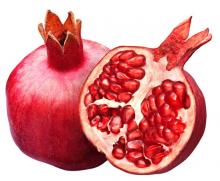ORLANDO – Pomegranate extract slowed prostate-specific antigen doubling time by more than 6 months in a broad population of patients with prostate cancer, but there was also a worrisome signal that it may accelerate the disease in some.
Overall, the median pretreatment PSA doubling time (PSADT) increased significantly from 11.9 months to 18.5 months post treatment (P less than .001) among 92 evaluable men with a rising PSA after primary therapy in the phase II, double-blind, multicenter study.
The increase in median PSADT was similar whether the men were randomized to one capsule daily (from 11.9 to 18 months) or to three capsules daily (from 12.2 to 17.5 months). A negative PSA slope, suggesting declining PSA values, was observed in 13% of patients, reported Dr. Michael Carducci, a professor of oncology and urology at Johns Hopkins University in Baltimore.
Nearly 20% of the population, however, had their PSADTs shortened, leading to treatment discontinuation.
"There is an apparent benefit across all PSA doubling times, although some shortening of PSA doubling time was seen," Dr. Carducci said at the Genitourinary Cancers Symposium.
Invited discussant Dr. Michael J. Morris of Memorial Sloan-Kettering Cancer Center in New York said that the study’s end point has never been prospectively validated to show anything in terms of clinical outcome.
"If you believe that prolonged PSA doubling time is clinically beneficial, what do we say about patients whose disease appears to accelerate as a result of taking the pomegranate extract?" he asked. "Do we say or suggest that a third to 40% of patients might be done some harm, or might have an earlier clinical end point? I don’t know, but I think that’s an issue of concern."
In an interview, Dr. Carducci said that Dr. Morris’s estimate appears to include anyone with a faster PSADT, but that a fair number of these cases occurred at baseline, with only 14 patients moving to a faster PSADT quartile during treatment.
"Whether chemotherapy or a natural product like this is used, sometimes it appears that the disease picks up," he said. "The relevance is that they come off treatment, and we could detect no clinical impact on those whose PSADT shortened."
During his presentation, Dr. Carducci acknowledged that the study was limited by the lack of a placebo, and that a number of reports in the literature – including studies of rosiglitazone (Avandia) and atrasentan (Xinlay) – have shown that placebo can slow PSADT.
"We did not have a placebo, so [these data are not] definitive and could be explained by on-study regression to the mean," he said, noting that data should be available in the near future from a 200-patient, placebo-controlled trial of pomegranate extract liquid.
A previous phase II study reported that 8 ounces of pomegranate juice per day increased PSADT more than threefold, from a mean of 15 months to 54 months post treatment in 48 men with a rising PSA after surgery or radiation (Clin. Cancer Res. 2006;12:4018-26). The study was limited to men who had a narrow baseline PSA level of more than 0.2 ng/mL but less than 5 ng/mL, and a Gleason score of 7 or less.
There are laboratory data to show that pomegranate extract more effectively controls the growth of prostate cancer than does pomegranate juice in prostate cancer cell lines, but no head-to-head comparison has been tested in patients, Dr. Carducci said.
In an effort to evaluate the extract in a broader patient population, the current study in 104 men allowed any type of primary local therapy, any PSA that was rising from a baseline level of at least 0.4 ng/mL, and any Gleason score.
The 101 men in the intent-to-treat analysis had a median Gleason score of 7, and about one-third of them had a baseline PSADT of 9 months or less. (Three patients were excluded from the intent-to-treat analysis because they did not have postbaseline PSADT. In addition, 8 men were dropped from the evaluable population of 92 men because they did not meet PSA entry criteria, and 1 took prohibited medication.)
The men were treated for up to 6 months (92% of patients), 12 months (70%), or 18 months (36%) with capsules containing 1,000 mg of pomegranate polyphenol, equivalent to 8 ounces of pomegranate juice. In all, 58% of patients completed the 18-month, double-blind portion of the study, and 42% discontinued treatment before progression, Dr. Carducci said.


